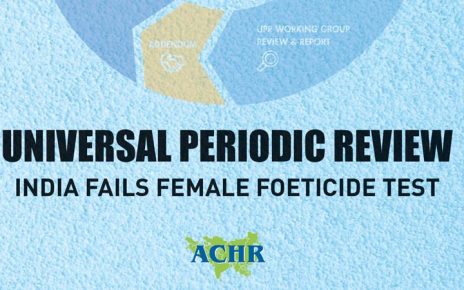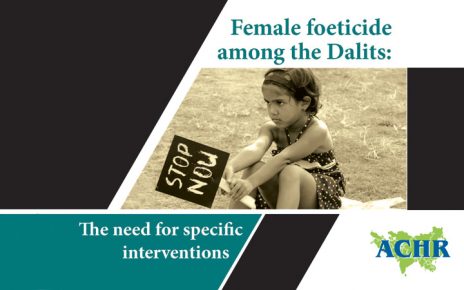Female foeticide because of preference for boys over girls for a host of reasons is gigantic in India. According to the estimates of Asian Centre for Human Rights, during 1991 to 2011, a total of 25,49,3,480 girls went missing primarily as a result of sex selection. The child sex ratio (CSR) in India has been consistently falling: from 933 in 1991 census to 927 as per 2001 census to 919 as per 2011 census.
The collusion of technology for sex selection is possibly the single most important contributor to the falling sex ratio.
Legal framework
The government of India had enacted the Pre-conception and Pre-natal Diagnostic Techniques (Prohibition of Sex Selection) Act of1994 (PC&PNDT Act) and defined the offences by the companies under Section 26 of the PC&PNDT Act.
Further, Section 3A of the Pre-conception and Pre-natal Diagnostic Techniques (Prohibition of Sex Selection) Rules, 2003 spelt out the responsibility of the manufacturers/ retailers/ importers/ refurbishers of diagnostic equipment capable of detecting the sex of the foetus with respect to sell, distribution, renting etc to any diagnostic facility. The companies are required to register first under specified format and send the list of those to whom the equipment/ machine has been provided once in three months to the concerned State/ UT Appropriate Authority and to the Central Government.
Since 2014, Section 3(B) provided that the protable machines can be used only in two circumstances i.e. within the premises it is registered, for services to the indoor patients and as a part of a mobile medical unit, offering a bouquet of other health services.
Further, as per Rule 18-A(7) and (8) of PC&PNDT Amendment Rules, 2014 the Appropriate Authorities are empowered to regulate the use of ultrasound equipment; monitor the sales and import of USG machines; ensue regular quarterly reports from ultrasound manufacturers and dealers; conduct periodical survey and audit of all USG machines sold and operating in the State; and file complaint against any unregistered owner or seller of the USG machine. Further, Sub-rule(2) of Rule 11(2) of Pre-conception and Pre-natal Diagnostic Techniques (Prohibition of Sex Selection) Rules, 1996 authorises the Appropriate Authorities to seal and seize any ultrasound machine, scanner or any other equipment, capable of detecting sex of foetus.
Yet these provisions have not been fully implemented having serious negative impact on the falling CSR.
The reality of corporate criminality
The Comptroller and Auditor General (CAG) of India found during the audit for the period 2010-11 to 2014-15 in Uttar Pradesh that the State Level Appropriate Authorities (SAAs)/District Level Appropriate Authorities (DAAs) did not take any action for mapping of sale of ultrasonography (USG) equipment and also did not call for any information regarding sale, installation and possession of Ultrasonography (USG) equipment from the manufacturers, suppliers, dealers, etc. Consequently, the number of USG equipments installed and the location of their placement were not known to the authorities to regulate the use of all the ultrasound machines. In Odisha, the CAG found that 806 machines were sold to 748 Registered Ultrasound Units as on 30 September 2014 but manufacturers had reported sale of only 278 (34%) machines with 66% sales were not reported by manufacturers and dealers. In Gujarat too, the CAG found during the for the period ending on 31st March 2014 that State Government of Gujarat found that out of 33 manufacturers/suppliers/dealers who applied for registration in the State, only two manufacturers had submitted the list for the quarter ending March 2014. The CAG also observed that some 14 clinics were booked by the DAAs for using sonography machines without registration but the authorities had not initiated any action against the manufacturer or even the supplier who had provided the equipment to these 14 clinics. Rajasthan became the first State to file a complaint in the court of chief judicial magistrate, Jaipur against 23 suppliers/manufacturers of ultrasound machines across the State who failed to register the sale of a single machine in the three quarters from April to December 2009. The companies named in the complaint include some of the major global companies in diagnostics – Wipro GE Health Care, Erbis Engineering Co Ltd, Pioneer Medical System, Philips Electronics India Ltd, Maestros Mediline Systems Ltd and Trivitron health care. But the State failed to follow up. On 27 July 2015, the Rajasthan High Court observed “….we are distressed to find that the compliance report does not even mention the name of the manufacturers and the dealers, nor any material has been annexed to show that the directions issued on 15th April, 2015 have been communicated to the manufacturers of the ultra-sound machines and the dealers”.
Government failure to comply with the Supreme Court directions
The non-compliance by the companies became one of the critical issues for the Supreme Court of India while disposing of the Writ Petition (Civil) No. 349/2006 in Voluntary Health Association of Punjab Vs Union of India & Others. Further, the Supreme Court specifically noted the use of portable ultrasound machines. In its order dated 04.03.2013, the Supreme Court stated “the Central Government vide GSR 80(E) dated 7.2.2002 issued a notification amending the Act and regulating usage of mobile machines capable of detecting the sex of the foetus, including portable ultrasonic machines, except in cases to provide birth services to patients when used within its registered premises as part of the Mobile Medical Unit offering a bouquet or other medical and health services. The Central Government also vide GSR 418(E) dated 4.6.2012 has notified an amendment by inserting a new Rule 3.3(3) with an object to regulate illegal registrations of medical practitioners in genetic clinics, and also amended Rule 5(1) by increasing the application fee for registration of every genetic clinic, genetic counselling centre, genetic laboratory, ultrasound clinic or imaging centre and amended Rule 13 by providing that an advance notice by any centre for intimation of every change in place, intimation of employees and address. Many of the clinics are totally unaware of those amendments and are carrying on the same practises.”
The Supreme Court in its order dated 04.03.2013 in Voluntary Health Association of Punjab Vs Union of India & Others directed the following with respect to the manufacturers/ retailers/ importers/ refurbishers of diagnostic equipment capable of detecting the sex of the foetus:
“5. States and District Advisory Boards should ensure that all manufacturers and sellers of ultra-sonography machines do not sell any machine to any unregistered centre, as provided under Rule 3-A and disclose, on a quarterly basis, to the concerned State/Union Territory and Central Government, a list of persons to whom the machines have been sold, in accordance with Rule 3-A(2) of the Act.
- Steps should also be taken by the State Government and the authorities under the Act for mapping of all registered and unregistered ultrasonography clinics, in three months time.”
Despite blatant violations of the Section 26 PC&PNDT Act and Rule 3 of the PC&PNDT Act as found out by the CAG, no effective measures have been taken to implement the Supreme Court directions dated 04.03.2014. The Minister of State in the Ministry of Health And Family Welfare Smt. Anupriya Patel while replying to the Lok Sabha Unstarred Question No. 1665 on 10 March 2017 stated the following with respect to implementation of these directions: “As per directions given by Hon’ble Supreme Court in Writ Petition (Civil) No. 349/2006 – Voluntary Health Association of Punjab Vs Union of India & Others vide Order dated 04.03.2013, all States/UTs were directed to take steps for mapping of all registered and unregistered ultrasonography machines. The Ministry of Health and Family Welfare has developed the Terms of Reference (TORs) and communicated the same to States/UTs. The Government is also rendering financial support under the National Health Mission (NHM) to the States and UTs for mapping of Ultrasound machines.”
The Government of India has admitted that the task “for mapping of all registered and unregistered ultra- sonography clinics, in three months time” as directed by the Supreme Court could not completed in three years time.
The current challenges
The current situation with respect to non-compliance by manufacturers/ retailers/ importers/ refurbishers of diagnostic equipment capable of detecting the sex of the foetus can be summarised in the following way:
- Acorss India, the compliance of the PC&PNDT Act by manufacturers/ retailers/ importers/ refurbishers of diagnostic equipment capable of detecting the sex of the foetus has been left to their mercy.
- The Government of India does not have any statistics of the number of unregistered ultra-sonography machines. As per the quarterly progress report (QPR) received from States/ UTs, as on 31st December 2016, a total of 56,079 bodies registered under the PC&PNDT Act but the government of India has no information about the number
of unregistered ultrasound machines. In 2016, India’s market for ultrasound systems was estimated at Rs.1212 crore.
- As per Rule 3B(1) of the PC&PNDT Rules of 1996, the use of portable ultrasound machine of any other portable machine or device which has the potential for selection of sex before conception\or detection of sex during pregnancy is regulated. Portable ultrasound machines is permitted only under two conditions: (a) within the premises it is registered for providing services to the indoor patients and (b)as a part of a mobile medical unit offering a bouquet of other’ health and medical services. However, portable ultrasound machines which are available online for prices ranging from Rs 8,700 to Rs 4.6 lakh per unit for a digital ultrasound system. There are no records of portable ultrasound machines being sold online.
- Once ultrasound machines are registered, there are no guidelines for disposal of ultra-sound machines.
- There are no guidelines on the import of ultrasound machines which are cheaply available abroad.
- There are no guidelines on re-sale or in any other manner transfer any ultrasound machine or imaging machine or scanner, or any other equipment capable of detecting sex of the foetus.
- The registration of ultrasound machines by the veterinary professionals and Animal Husbandry Department are yet to be completed.
Conclusion and recommendations
India’s market for the Indian ultrasound systems is one of the largest in the world. In 2016, India’s market for ultrasound systems was estimated at Rs.1212 crore. The market analysts expect it grow at a steady pace mainly because the Government of India is implementing schemes like the Janani Suraksha Yojna to reduce mortality rate.
It appears that the actions under the PC&PNDT Act are directed towards the users of the ultrasound machines (doctors, clinics and other person which includes association of persons, body of individuals and a company). However, sufficient steps are not being taken against manufacturers/ retailers/ importers/ refurbishers of diagnostic equipment capable of detecting the sex of the foetus for their criminal failure to comply with the PC&PNDT Act. If the illegal use of the machines by the unscrupulous professionals is to effectively addressed, the problems have to be nipped in the bud i.e. appropriate actions ought to be taken against manufacturers/ retailers/ importers/ refurbishers of diagnostic equipment capable of detecting the sex of the foetus. Otherwise, establishing accountability remains an uphill task as has been the case.
Recommendations
Asian Centre for Human Rights recommends the following to the Ministry of Health and Family Welfare and in particular, Central Supervisory Authority under the PC&PNDT Act:
- Implement the Supreme Court judgement and direct all the manufacturers/ retailers/ importers/ refurbishers of diagnostic equipment capable of detecting the sex of the foetus to submit all the detailed information about the machines sold to the State Appropriate Authorities within three months;
- Instruct to register cases for violations of the PC&PNDT Act by the manufacturers/ retailers/ importers/ refurbishers of diagnostic equipment capable of detecting the sex of the foetus and ensure the prosecution of those responsible within six months;
- Amend the PC&PNDT Rules for prohibition on sale or otherwise transfer of ultrasound machines to persons, laboratories, clinics, not registered under the PC and PNDT Act;
- Amend the PC&PNDT Rules to prohibit sell or in any other manner transfer any ultrasound machine or imaging machine or scanner, or any other equipment capable of detecting sex of the foetus to any genetic counselling centre, laboratory, clinic or any person not registered under the Act;
- Amend the PC&PNDT Rules to prohibit sale of portable ultrasound sonography machines online and further only to the hospitals and institutions where they would be used for diagnostic purposes on critically ill patients and allowed to be carried as part of mobile health care units;
- Direct the Veterinary Council of India to complete registration of ultrasound machines being used veterinary hospitals within three months;
- Amend the Hazardous Waste (Management, Handling and Transboundary Movement) Rules of 2008 for proper disposal of the ultra-sound machines including through a central registry systems by making it digital; and
- Amend Section 3 of the Drugs and Cosmetics Act, 1940 and the Rules to include the ultrasound machines and its accessories so that manufacturers/ importers/ refurbishers of ultrasound machines are included in a monitoring system.




